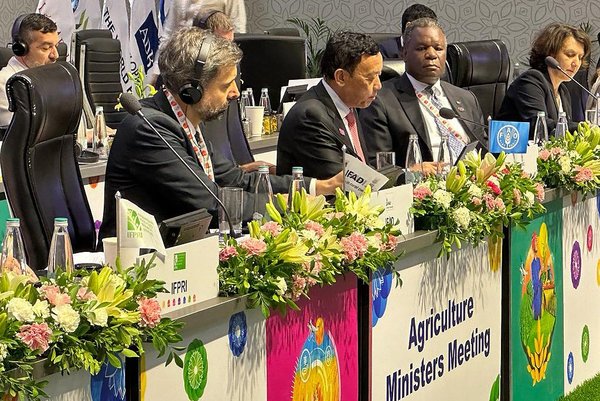 Read this article in French
Read this article in French- Share this article
- Subscribe to our newsletter
G20 Agriculture Ministers Meeting
The G20 Agriculture Ministers met in Hyderabad, India, from the 15th to the 17th June to discuss transformation towards sustainable food systems.
Agrifood systems must be part of the solution to the loss of biodiversity and the climate crisis facing our planet, the Director-General of the Food and Agriculture Organization of the United Nations (FAO), QU Dongyu, said at the meeting.
In addition to issues concerning transformation towards sustainable food systems, the meeting focused on global food security and strengthening the right to food as well as good global cooperation. Despite agreement on the key contents, this year too, the G20 countries were unable to adopt a consensual final declaration.
Commenting on this, Parliamentary State Secretary to German the German Federal Minister of Food and Agriculture Claudia Müller noted: "Given the Russia’s ongoing war against Ukraine and its massive consequences for world food supplies, we could only approve of a declaration clearly addressing the condemnation of Russia. Unfortunately, no consensus could be reached on this in the framework of the G20."
Some results were nevertheless reached. In the Outcome Document of the G20 Agriculture Ministers’ Meeting, participants underline that achieving overall nutrient adequacy should first and foremost be based on the consumption of a variety of foods. At the same time they note that biofortification can be an effective way of improving nutrition and encourage research on the biofortification of crops.
Moreover, they call for an integrated and multi-sectoral “One Health” approach to simultaneously balance and optimise the health of people, animals, plants and ecosystems, and to combat antimicrobial resistance (AMR) to reduce the risks from emerging, re-emerging and currently occurring zoonotic diseases with pandemic potential and other threats to global public health security.
In order to achieve SDG12.3, halving per capita global food waste at the retail and consumer levels and reducing food losses along production and supply chains, including post-harvest losses, by 2030, they committed to prioritise reduction in food loss and waste. Therefore they will encourage collaboration across stakeholders (farmers, governments, private sector, civil society, academia and development partners) and support smallholder farmers through training, enhanced access to finance and improved market linkages.
The Outcome Document highlights the importance of digitalisation for agricultural transformation. Digitalisation in agriculture supported by appropriate digital infrastructure has the potential to transform the sector and help governments and other stakeholders to address the current food, environmental, and socio-economic challenges, it states. Participants committed to collaborate with all stakeholders and strengthen capacity-building efforts, including dissemination of digital tools and technology and promoting its adoption by farmers, especially by marginal smallholders, family farmers, women, youth, indigenous peoples as applicable, ageing farmers and other underrepresented groups.
Ines Lechner, editor, Rural 21
More information:





Add a comment
Be the First to Comment